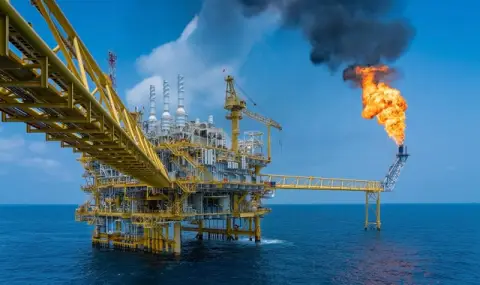Oil prices rose sharply today after the Israeli strikes on military and nuclear facilities in Iran. The market is worried about military escalation in the Middle East and possible disruptions to oil supplies from the region. France Press, quoted by BTA, presents some explanations for the rise in the price of black gold.
Why is oil rising?
The rise in price is explained by the increase in the so-called geopolitical risk premium, which means that a barrel becomes more expensive because investors are not sure whether they will encounter problems with purchases in the future. Brent crude rose to around $75 today.
With its attack on Iran, suspected of seeking nuclear weapons, Israel's actions led to a jump in oil prices of around 10 percent (and even up to 13 percent), a rise that is rare.
According to Jorge Leon, vice president at the Norwegian consulting firm "Rystad Energy" (Rystad Energy), the current geopolitical risk premium of about $ 8 per barrel is even higher "relative to the levels of October 2024", after the first exchange of blows in history between Iran and Israel.
Since today's attacks were not primarily aimed at Iran's oil infrastructure, there is no immediate reduction in production or supplies.
However, investors fear that this is only a matter of time - the Iranian armed forces have warned that they will have "no limits" in their response, suggesting an increase in escalation.
Can the price of black gold continue to rise?
If exports from the Middle East are limited due to the situation, further oil prices are possible, writes AFP. With production of about 3.3 million barrels per day, Iran is the ninth largest producer in the world, experts report. Tehran exports just under half (1.5 million barrels) of its output, with the rest remaining in the country.
"If Iran's oil production and export facilities were attacked", the price of Brent crude could reach at least $80 a barrel, according to economists at "Capital Economics".
"The absolute nightmare would be to close the Strait of Hormuz (the narrow mouth of the Persian Gulf, a key sea route for oil tankers)", said Arne Lohmann Rasmussen, chief analyst at risk management firm "Global Risk Management". "If Iran were to block this narrow strait, it could affect up to 20 percent of global oil flows" or nearly 20 million barrels per day, Rasmussen points out.
In this case, "the market reaction would be much more serious", confirms Jorge Leon, who predicts a price increase of "20 or more dollars per barrel".
What could be the role of the United States?
Analysts are already doubting that negotiations between Tehran and Washington can continue, although it was previously announced that new talks would be held on Sunday in Oman.
If an agreement is not reached, it is likely to lead to more serious US sanctions against Iran - part of Donald Trump's "maximum pressure" strategy against Tehran.
In the event of a blockade of Iranian exports by the United States, the possibility of a drop in oil supplies being in the range of only 0.5-1 million barrels per day is assumed, Bjarne Schildrop, chief commodities analyst at the Swedish bank SEB (Skandinaviska Enskilda Banken - SEB), told AFP. China is the main importer of Iranian oil and will continue to buy it, he added.
Beijing has already managed to circumvent UN sanctions by using "small private Chinese refineries with no international assets or operations" that are not subject to as much international sanctions on Iranian oil imports as state-owned refineries, Schildrop said.
Who benefits from the increase in the price of oil?
A reduction in Iranian oil production could allow Saudi Arabia and other members of the Organization of the Petroleum Exporting Countries and its allies (OPEC+) to produce more and capture new market share, while also benefiting from high prices.
Since April, OPEC+ has significantly increased the oil output it supplies to the world market.
These increases, combined with a negative economic outlook related to US President Donald Trump's tariff policies, have led to sharp drop in prices, AFP recalls.
